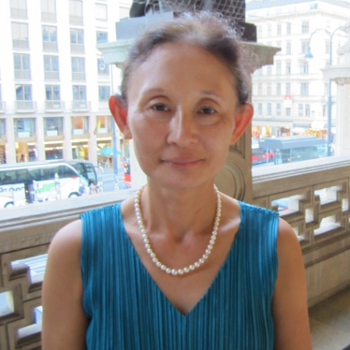“Is the bed smaller?” I asked a couple of friends at the intermission as the revival of Michael Mayer’s 2018 production of La traviata got off to a rousing start with Aleksandra Kurzak’s note- and pitch-perfect “Sempre libera” which brought down the house at the end of Act 1. No, the bed was the same size, but somehow its intrusiveness was diminished as it sat in center stage throughout the opera. Mayer’s many other directorial excesses that make the production look like a busy Technicolor Disney film hardly interfered with the splendid musical performance of the evening, delivered by professional and committed singers, chorus, and orchestra led by Karel Mark Chichon.
At the center of the evening’s success was Ms Kurzak, who gave one of the best interpretations of the tragic heroine Violetta in recent memory. Her rich and warm voice is the best fit for the role’s vocal demands of Act 2 including Violetta’s impassioned love duet with her lover Alfredo and later her heartbreaking encounter with his father Germont. Ms Kurzak’s dramatic singing encompassed a range of emotions from joy, bewilderment, anger and sorrow with such technical dazzle and emotional roller-coaster that she was utterly gripping on stage. Her effective use of rubato added further excitement, while her judicious sprinkling of pianissimo phrases was breathtaking. If her Act 1 coloratura did not flow quite as lightly or freely as one would like, and her Act 3 death scene lacked emotional fragility and utter devastation as her voice remained robust, those are very minor quibbles of an impressive vocal achievement.
Ms Kurzak’s vocal and dramatic commitment brought out strong performances by her colleagues. Dmytro Popov’s tenor lacks natural glamor and sheen but is pleasant and robust. His stiff stage presence fit the shy youth in love; he seemed to relax in Act 2 and was ardent in his duet with Ms Kurzak and was desperate when his father admonished him. Quinn Kelsey’s Germont represents the best in Verdi singing: a sumptuous voice with subtle coloring combined with beautiful legato. He acted as a stern but not unsympathetic father figure for young lovers. Smaller roles were well sung. Brian Michael Moore’s Gastone was memorable with his bright voice and animated stage presence. Megan Marino sang Flora with spunk and humor, and Trevor Scheunemann’s Baron impressed with his resonant voice.
The Met Orchestra played with their characteristic beauty and skill. Strings shimmered in the aching preludes, and woodwinds danced in the party music. Maestro Chichon did not indulge in sentimentality of melodies but neither did he eschew from emphasizing varying tempi and dynamics of the score for dramatic effect. The chorus made worthy contributions to the party scenes, while dancers in Act 2 ballroom scene did what they could, in awkward choreography, dancing around and over the ubiquitous bed.
In Mayer’s production, the four scenes of the opera are depicted as the spring, summer, fall and winter, symbolic of Violetta’s love and life. The colors are bright, especially the costumes of party guests in Act 1, and staging is fussy. While there are some interesting lighting effects and arresting images, the production is over the top and busy with unnecessary touches. One of the worst sins of the production is the presence of a mute young girl, Alfredo’s sister, in the Act 1 prelude (Violetta’s death scene enacted), and in Act 2 during Germont’s visit to Violetta. When she appears in a wedding gown sleepwalking across the stage during the Act 3 prelude in Violetta’s feverish imagination, one must protest in earnest. The director trivializes Violetta’s tragedy as a cheap love story of a courtesan, and diminishes the impact of what really ails her and destroys her love for Alfredo, the patriarchal society that treats women as an object.




